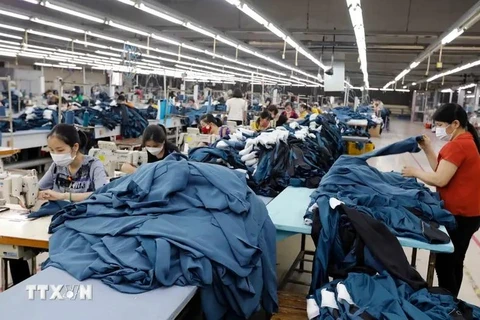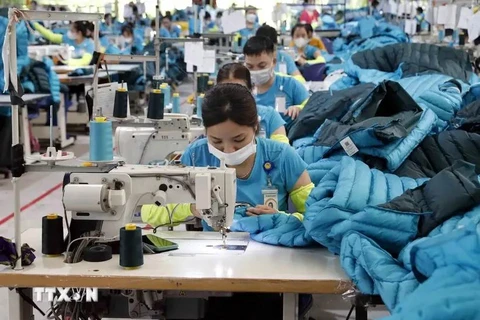
HCM City (VNA) - Vietnam's textile and garment industry has fulfilled its 44-billion-USD export turnover target in 2024, an increase of over 11% compared to 2023, thanks to efforts in market diversification, technological innovation, and effectively capitalising on the shift in orders.
According to the Vietnam Textile and Apparel Association (VITAS), the achievements in 2024 and positive market signals at present provide a solid foundation for the industry to set an ambitious goal of 47-48 billion USD in 2025.
To date, many businesses have signed order agreements for the first quarter of 2025 and are negotiating for the second quarter.
According to VITAS Chairman Vu Duc Giang, although global consumption of textile and garment products did not increase in 2024, Vietnam's exports still recorded positive results. Thanks to its production capacity, and social and political stability, Vietnam has become one of the preferred alternative supply sources for foreign textile and garment buyers.
Vietnam's efforts to diversify markets, customer partnerships, and export products in recent years have proven effective. Vietnamese textiles and garments are now exported to over 100 markets worldwide, including traditional markets such as the US, the European Union, Japan, China, CPTPP member countries, and ASEAN, and new markets like Africa and the Middle East.
The implementation of FTAs has also brought significant advantages, opening up a vast market for Vietnam's textile products. With advantages brought by the Vietnam - Eurasian Economic Union Free Trade Agreement (VN-EAEU FTA), Vietnam's textile exports to the Russian market saw a remarkable surge to 1 billion USD this year.
In a recent analysis report for the sector, experts from SSI Securities Corporation noted that Vietnam will continue to benefit from the shift of orders from China, due to its lower labour costs and the lower import tariffs imposed by the US on Vietnamese goods compared to Chinese products. Vietnam also holds an advantage in having a more skilled workforce than India and Bangladesh.
Tran Nhu Tung, Chairman of the Board of Directors of the Thanh Cong Textile Garment - Investment - Trading JSC, and Vice Chairman of VITAS, predicted that in 2025, the textile industry can maintain a growth rate of around 10%, with export turnover expected to reach 47-48 billion USD.
To realise this goal, businesses need to promote technological innovation, digital transformation, increase financial investment, and improve the quality of human resources, to further enhance their competitiveness, he suggested./.






















